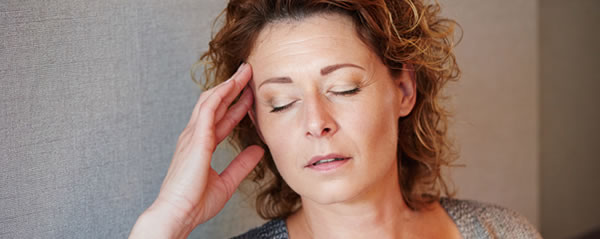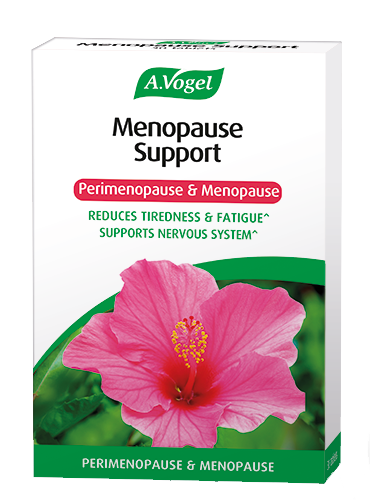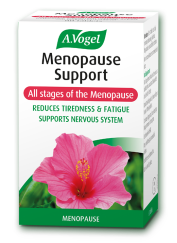Read the full video transcript below
Today's topic
Hello, and welcome to my weekly video blog. And today on A.Vogel's Menopause I'm going to be talking about dizziness and light-headedness in the menopause.
Why am I feeling light-headed and dizzy?
This is a really common symptom and an awful lot of women contact me asking whether this is a menopause symptom.
Yes, it certainly can be. One of the main reasons it happens is the fact that falling oestrogen can affect your circulation and can also affect your blood pressure. And these two things alone will be enough to trigger dizziness and light-headedness.
Other menopause symptoms which can cause dizziness

Hot flushes
But there can be other menopause symptoms involved as well, and the funny thing is that one of the most common ones is hot flushes. And very often, women will say that they either start to feel a little bit dizzy and then they get a hot flush, or else they get a hot flush and then start to feel dizzy.
This is really quite logical because when you have a hot flush your blood vessels suddenly open up, and that can cause the blood to rush to any particular area of the skin. And that means that there can be slightly less going to the brain, and that can make you feel a little bit dizzy or light-headed.
Fatigue
It can also be fatigue. If you're really tired, if you're really struggling to keep awake or doing all the things that you're going to do, then very often, you can certainly get a little bit dizzy or light-headed.
Anxiety & palpitations
It can also be due to anxiety and palpitations. Palpitations and dizziness, again, because the heart is overworking. Very often, these two things will be connected. And anxiety, especially if you start to feel that you're getting an anxiety attack, then you can get the dizziness and light-headedness as part of this particular scenario.
Heavy periods
It could be heavy periods. Now, if you are in the peri-menopause and your periods are starting to get really heavy, or a lot closer together, or are going on for a lot longer, then this can cause low iron or anaemia, and that in itself can cause dizziness and light-headedness.
The problem with low iron is that even a year or two after your periods may have finished, if you have been low in iron all that time, then again, it can trigger these symptoms. So even if you've not had heavy periods for quite a while, it's still important to just make sure that you've linked these two together.
If that's the case, then it really is important to go to a doctor and just ask to get your iron levels checked. If they're low, you'll be recommended an iron supplement and very often, that can sort it out really, really quickly.
Other causes of dizziness
Dehydration
Other symptoms which are not specific menopause ones, but do happen a lot in the menopause is, first of all, dehydration.
Especially in hot weather, if you get very dehydrated that can give you dizziness and certainly light-headedness.
Low blood sugar
Low blood sugar, you know, another classic menopause symptom, your blood sugars can get very erratic and dip very suddenly, and that can give you the dizziness, too.
Allergies & sinus infection
It could be allergies, infection if you've got hayfever. A lot of menopausal women find they get much more sensitive to allergies and infections, and that could be a link between them.
Stimulants
And it can also be stimulants such as caffeine, sugar, alcohol, and smoking. I know for me, if I ever indulge in a really strong cup of coffee, I tend to feel quite spaced out for about half an hour to an hour afterwards, and it can be really quite disconcerting, especially if you're on the move.
What does dizziness during menopause feel like?
So what does this dizziness and light-headedness feel like? There's three kind of main symptoms that you may feel. You can sometimes feel that everything is spinning, that your environment is spinning, or whirling, or going just that little bit out of focus. You may find that you get a little bit of loss of balance, especially if you're standing up.
You might sort of stagger for a second or two, and the other one is that you feel that you are actually going to faint or pass out.
How to stop feeling dizzy
Now, how can you stop this happening?
Step 1: Sit down
First of all, if you start to feel a little bit dizzy or light-headed, it's important to sit down, or if you don't have any chairs roundabout you, then maybe lean against a wall.
Step 2: Focus
Sometimes focusing on an inanimate object, try saying that, can help your brain to focus just that little bit better, and that can sometimes bring your body back into balance.
Step 3: Breathe deeply
Start taking some really deep breaths. That can very often help, and we do know that especially if you're sitting at a desk for a long time, your breathing can get extremely shallow, and that can be a big factor, too. So lots of really nice deep breathing can be a good help for this.
Step 4: Drink a glass of water
Water, and sometimes if you feel the dizziness coming on, taking a good sip of water especially if it's the dehydration that's causing it, that can very often stop it in its tracks.
A few herbal helpers for menopausal dizziness
Now, there are herbs and supplements you can take to help here. If it's definitely the falling or low oestrogen that's a factor, you could look at our Menopause Support if it's appropriate.
|
|
A.Vogel Menopause Support | For Perimenopause, Menopause & Postmenopause Symptoms
£8.99 (30 tabs) In Stock
The herb ginkgo biloba is very good for improving circulation to the head, and it's also good for memory so you're getting double benefits with this particular herb.
If you're getting the dizziness or the light-headedness associated with a hot flush, then you could look at the herb sage, and this usually tends to work very quickly.
When to consult your doctor about dizziness
So as you can see, there are a lot of things that you can do to help yourself. But the really important thing here, all of us at some point will have a dizzy moment, especially like me, you know, with extra caffeine, but if you keep getting dizzy, if you keep getting light-headed, if you faint, then it's really important to go to your doctor and get this checked out just to find out what's causing it.
It could be something simple as low blood pressure. It could be something simple as anaemia. So these can be sorted quite easily. So don't put up with this particular symptom. Do get it checked out.
So hopefully, this has been helpful. If anybody else has any tips that's helped them with the dizziness or light-headedness, please let us know. And I'll see you next week for another edition of A.Vogel Talks Menopause.











